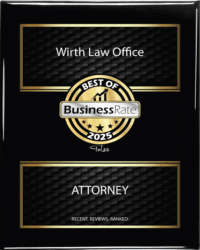Ensuring Confidentiality: Safeguarding Client-Attorney Conversations
When and where is it a good time to have a privileged conversation with your attorney? My name is Carl Birkhead. I’m an attorney with Wirth Law Office in Tulsa, Oklahoma. I want to help you make law easy by talking a little bit about when and where privilege applies and when and where it’s best to just maybe not have that conversation.
The Basics of Attorney-Client Privilege
Okay, so attorney-client privilege, I’ll just give you a brief overview. It applies when only you and your attorney are involved in the conversation. So if you’re emailing your attorney and nobody else is on the email chain, or you’re on the phone call directly with your attorney’s office, or you’re meeting with your attorney one-on-one, you are covered by this privilege.
If you’re trying to talk with your attorney about sensitive stuff in public, it gets dicey and you’ve got to be careful. There are plenty of times when if I’m in court with one of my clients, we’ve got a notepad, we’ll write notes back and forth during the middle of the hearing just to make sure that we preserve confidentiality and still can exchange information back and forth.
Risks of Breaking Confidentiality
But sometimes people kind of forget that privilege doesn’t apply if other people hear it. So I mean, if it’s something where you say, I’m your lawyer, and we have a conversation and you go home and you tell your best friend everything we talked about word for word, or you show your family just our email chain, that breaks confidentiality.
It seems kind of silly, but it can get pretty important. The other day I was in court on a criminal docket, and as I was walking out of one courtroom, I saw a lawyer and client walking out of another courtroom, also a criminal docket over there. And this client is very loudly for his attorney and for all of creation to hear going, I don’t know why they’re telling me I can’t put hands on people.
Everyone could hear it. I can only assume that this is some sort of protective order violation case or assault and battery, or maybe even worse than that. All I know is no matter how you’re feeling if you’re feeling some type of way about how your case is going or what you feel about how the judge is telling you you can or cannot act, venting in public is risky.
Consequences of Public Disclosure
All it would have taken was someone from the DA’s office who was familiar with that case, who knew that client, who knew the charges to have heard that and go back and talk to the state about it. Or if the prosecuting attorney heard that themselves, it’s not going to do you any favors. Anyone who heard that exchange can now be called as a witness about it.
Maybe the prosecutor hears it and they decide they’re not going to go with the plea deal that they negotiated with that person’s attorney. Or maybe they decide that they’re going to pursue a heavier sentence. Or maybe they had filed something as a lighter charge and they decided based on that attitude they’re going to try to amend the charges.
Ensure Confidentiality with Professional Guidance
If you have questions about this or if you’re wondering when and how to discuss these things with your attorney or maybe you need a lawyer and you want to have a confidential conversation about it, please give us a call. I’m criminal attorney Carl Birkhead. I’m with Wirth Law Office and I want to help you to make law easy. Thank you.
Start with a Low-Cost Strategy Session
For a low-cost initial strategy session to discuss your legal needs and ensure your conversations remain confidential, contact us today at 918-879-1681. Let us guide you through the complexities of your case with the assurance of privacy and professionalism.






















